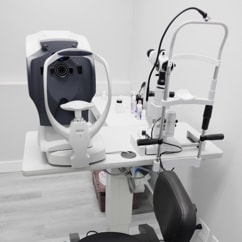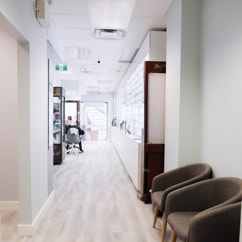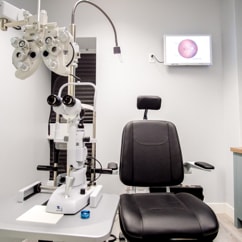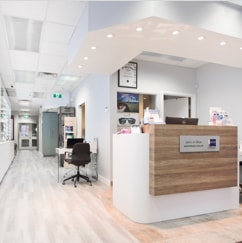- Toronto, ON
- 416.925.1758



Progressive Lenses at Specs on Bloor in Toronto
Book an AppointmentPresbyopia
Presbyopia is a normal occurrence that happens as we age, caused by the typically flexible, clear lens in the eye losing its elasticity. When the lens becomes stiff, it is difficult for the eye to change focus between something close up and far away, creating an inability to focus on anything close up.
Presbyopia typically begins to develop in early-to-mid 40’s and can either appear slowly or very rapidly. The most noticeable symptoms of presbyopia are:
- Difficulty reading fine print
- Having to hold objects at arm’s length away from the face to see clearly
- Blurred vision at a normal reading distance
- Frequent headaches or eye strain after reading or doing close-up work
Unfortunately, presbyopia is a natural part of the ageing process and cannot be prevented or reversed. However, multifocal eyeglasses and reading glasses have made life easier for individuals by providing vision correction for both near and far distances.
The History of Progressive Lenses
The History of Progressive Lenses
Eyeglasses have humble beginnings in human history, evolving from primitive glass spheres to the elegant eyewear we have today.
In the 17th century, concave and convex lenses were discovered to improve both near and farsightedness, respectively. Eyeglass frames were also created during this time by Spanish, Chinese, and Italian missionaries, using various methods to keep the eyewear on the bridge of the nose.
Benjamin Franklin pioneered the first bifocal glasses in 1794, which he referred to as “double spectacles.” Franklin, who had presbyopia, wrote to his optician, and requested his long-distance glasses and reading glasses be sliced in half and sutured together to form 1 lens for each eye.
As these glasses proved successful, Benjamin Franklin was credited with the invention, but he never intended to profit from it. As with the iron stove, Franklin wanted to make the lives of his loved ones easier.

Zeiss Progressive Lenses
For over 160 years, ZEISS has stood for better vision. Building upon the company’s optical expertise, which was founded in 1846, ZEISS has since introduced a multitude of optional innovations and has helped millions of scientists, physicists, doctors, and even astronauts go far beyond imaginarily possible to accomplish their goals.
Even today, Carl Zeiss remains committed to ensuring optimal vision. Every eye is as individual as the human fingerprint, and no other sensory organ allows us to perceive and experience our environment as intensively. Therefore, it is especially important for us to fully take this individuality into account during patient consultation and diagnosis and in the production of ZEISS eyeglass lenses.
We offer Zeiss brand progressive lenses so you can feel comfortable receiving some of the highest quality optical
lenses on the market today.
![]()
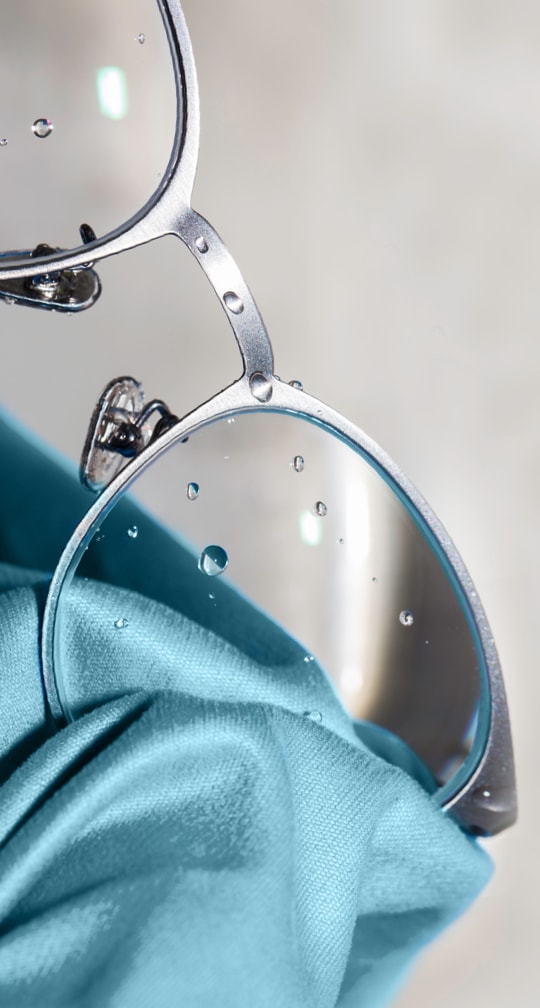
Visit Our Office
Taking Public Transit
We are around the corner from the St. George TTC station on the Bloor Line.
Where to Park?
Street parking on Bloor St, Huron St, Bedford Ave & Prince Arthur Ave, underground parking next door at Kimpton Hotel, Green P west on Huron St.
Our Address
268 Bloor Street WestToronto, ON M5S 1V8
Contact Information
- Phone: 416.925.1758
- Email: [email protected]
Hours of Operation
Please note: We are closed on all statutory holidays.
Our Services
Our Brands






What Our Patients have to Say
Specs On Bloor has a great selection of independent designer eyewear – lots of fun colours and styles. The space is spotless and has a chic modern interior.Helen, the optician is very knowledgeable and helpful. The optometrist, Dr.Michael Lee is also great! He was friendly, patient and extremely thorough during the eye exam and happily answered all questions – one of the best optometrist’s I have visited to date.Would definitely recommend Specs on Bloor as the go-to place for all eyecare and eyewear needs!
J
I’ve gotten a few pairs of frames, both glasses and sunglasses, at Specs on Bloor, over the years. The opticians are always so friendly, helpful, and patient with me as we find the right pair of frames. The turn-around time for frames is very quick and I appreciate the care they take with my eye care! They also offer a nice student discount. Thanks Specs on Bloor!
Zoe
Was very impressed when visiting here. I was still nervous to go out during Covid, but after seeing the attention to cleanliness and sanitizing, I was more than comfortable shopping here. Every pair of glasses I tried on was set aside to be sanitized before being put back on the shelf. The staff was great and very helpful, and the selection they had was more than I was expecting. Will be coming here from now on.



